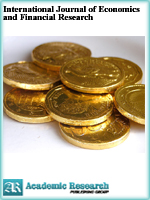International Journal of Economics and Financial Research
Online ISSN: 2411-9407
Print ISSN: 2413-8533
Print ISSN: 2413-8533
Quarterly Published (4 Issues Per Year)

Archives
Volume 3 Number 6 June 2017
Empirical Appraisal of Poverty-Unemployment Relationship in Nigeria
Authors: Okorie, George Chisom ; Anowor, Oluchukwu F.
Pages: 91-97
Abstract
The relationship between unemployment and poverty has been of interest to many a scholar with interest in development economics and social sciences. This paper is an addition to the empirical attempts to re-examine the relationship between unemployment rate and poverty incidence in Nigeria using secondary data sourced from relevant institutions to obtain major Social and Economic indicators spanning within 1980-2015. The study used Trend graph analysis, Correlation coefficient analysis and Granger causality tests in its analyses. As shown from the results, there is a positive-significant correlation between unemployment and poverty in Nigeria. More so, this was corroborated by the Trend graph analysis. It also established that unemployment granger causes poverty in Nigeria as suggests from the Granger causality tests. The economic implication of this result is that poverty is an increasing function of unemployment; and the Error Correction Mechanism (ECM) pointed that short run disequilibrium in the economy can be returned to equilibrium in the long run with a poor speed of adjustment of 6 %. In the light of these findings, this study recommends that efforts should be intensified in Nigeria towards implementation of unemployment reduction policies as this will significantly reduce poverty incidence.
Transmission Effect of the Interaction between Parallel and Official Foreign Exchange Markets in Nigeria
Authors: Ogbulu, Onyemachi Maxwell ; Torbira, Lezaasi Lenee
Pages: 76-90
Abstract
This study investigates whether there is any interaction existent between the exchange rate movements in the official and parallel foreign exchange markets and whether or not the official exchange rate manipulation can serve as an instrument for controlling the parallel market rate. The study utilizes annual data series for official foreign exchange rate and parallel foreign exchange rate in Nigeria for the periods 1980-2012. We employed the unit root test, Q-test, BDS and ARCH test to evaluate the linear dependence and volatility in the series while the Bivariate GARCH was used to test for transmission existent between the official and the parallel foreign exchange markets. The unit root test results report that all the variables prove to be stationary at first difference, the Q-test shows evidence of no linear dependence in the series thereby suggesting that the series are not linearly correlated and that both the official and parallel exchange rates are random in nature. The BDS test revealed the existence of linear dependence meaning that there is serial correlation existent between the items in the series and also suggesting that both the official exchange rate and the parallel exchange rate can be predicted. The ARCH test results indicate that there is the influx of volatility in the two markets and that the series are volatile in nature. The Bivariate GARCH test for transmission existent between the two markets reveals that volatility does not transmit from the official foreign exchange market to the parallel foreign exchange market. This negates the exchange rate pass-through theory but supports the theory of exchange rate disconnect. The study therefore posits that changes in the official exchange rates are not important in explaining or influencing changes in the parallel exchange market in Nigeria. Thus, policy makers may not be able to use the manipulations of the official foreign exchange rate as a tool for controlling the activities of the parallel foreign exchange market in Nigeria. The study recommends that the managers of the Nigeria economy should ensure influxive design and implementation of policies and strategies that will ensure a more favourable official exchange rate regime in Nigeria so as to eliminate the wide premium existent between the two markets.



